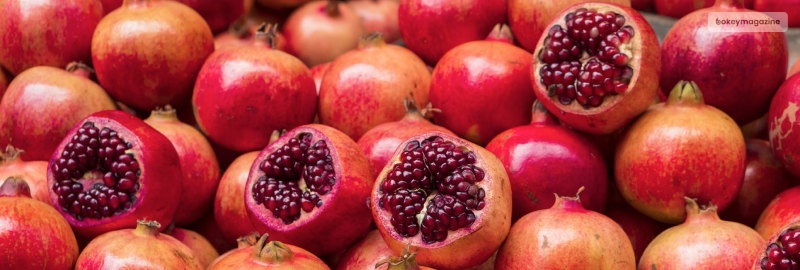
Is It Ok To Eat Pomegranate Seeds?
Is it ok to eat pomegranate seeds? I remember my mum bringing me a bowl full of pomegranates as it was the best thing I could have as a woman. We women are slightly anaemic. Pomegranate is the best alternative if you want to cut down on the medication to increase hemoglobin in the blood.
However, there are still many complications regarding the edibility of pomegranate seeds. Simply, pomegranate seeds have healthy nutrients and antioxidants. Pomegranate seeds also contain anti-inflammatory properties in them. So, it is safe to say that they are some of the best things you can have – haemoglobin deficiency or not.
However, there is a lot more to it than what we know on a surface level. This is the reason why we are here today. Together, we are going to explore if it is at all okay to eat pomegranate seeds and what benefits they bring to the body.
Is It Ok To Eat Pomegranate Seeds?
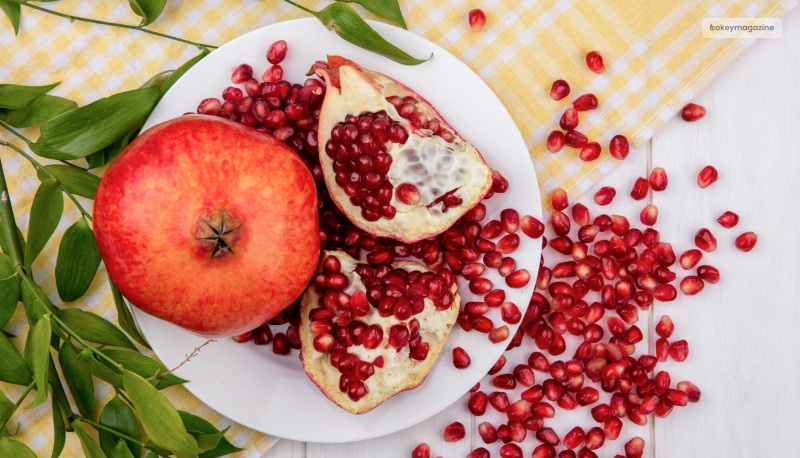
To clear it once and for all, pomegranate seeds are totally safe for consumption. They are excellent sources of multiple vitamins and nutrients. People also call pomegranate seeds arils.
You will be surprised to know that in fresh surroundings, the seeds are also safe for consumption. But it is quite bitter, and people do not prefer eating it. You can also consume pomegranate skin if you wish to. But, in most cases, it is only used as an extract.
There are multiple ways in which you can incorporate pomegranate seeds into your everyday diet. Some prefer it in their salads, while for others, it is a great snacking option. Me, I usually prefer it post-lunch. A small bowl of fresh and juicy pomegranate seeds can actually make you feel a lot more refreshed than anything ever.
Benefits Of Eating Pomegranate Seeds
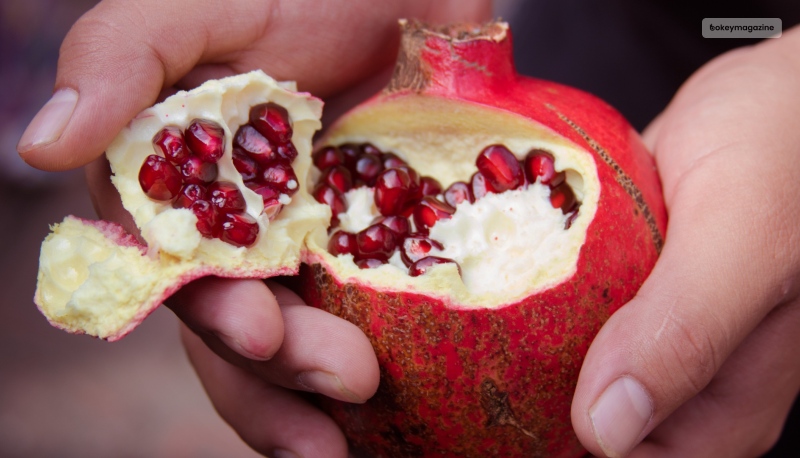
If you think that pomegranate seeds are only good for increasing Haemoglobin count in your blood, you might want to give it a second thought.
There are way more benefits to eating pomegranate seeds every day than you and I know. So, let us go through some of those benefits and see why pomegranate seeds are one of the most nutritious fruits ever.
Nutrients
Pomegranate seeds are highly rich in a number of vitamins and many other nutrients. Around 87 grams, or half a cup of pomegranate seeds, have:
- 205 milligrams of potassium
- 8.87 milligrams of vitamin C
- 10.4 milligrams of magnesium
So, you can imagine the high supply of nutrients your body is going to get upon consuming one cup of pomegranate seeds every day.
Antioxidants
Pomegranate seeds are also pretty rich in antioxidants. It helps protect the body from inflammation and any free radical damage. Antioxidant content depends on the varieties of pomegranate. But, regardless of their types, they all have high levels of these healthy bioactive components.
The peel is also rich in antioxidants. However, very few people actually eat pomegranate peels. These antioxidants include flavonoids, tannins, and anthocyanin.
Fibers
Just half a cup of pomegranate seeds have 3.48 grams of fiber.
Fruit fiber helps maintain the proper functioning of the digestive system. It also promotes good gastrointestinal health.
Along with promoting excellent gut health, eating good amounts of fiber or whole fruits reduces the risks of heart disease and diabetes. It also helps with long-term weight management.
Low Calorie
Pomegranate seeds have 83 calories for every 100 grams. They can add some extra flavor to your dishes with a few more calories. You can also make them a good low-calorie snack option.
Unique Fatty Acids
Pomegranate seeds have approximately 12-20 percent seed oil. There is a good quantity of punic acid in this oil. It is a polyunsaturated fat.
Studies done in animals claim that punicic acid reduces inflammation. It also improves insulin sensitivity.
There is some research done on humans. They confirm that pomegranate seed oil does have some effect on blood sugar. Alongside, punicic acid decreases the risk of inflammation in the brain.
The latter might be pretty useful to treat specific neurodegenerative diseases such as Alzheimer’s. However, we still need more research to solidify these conclusions.
How To Eat Pomegranate Seeds?
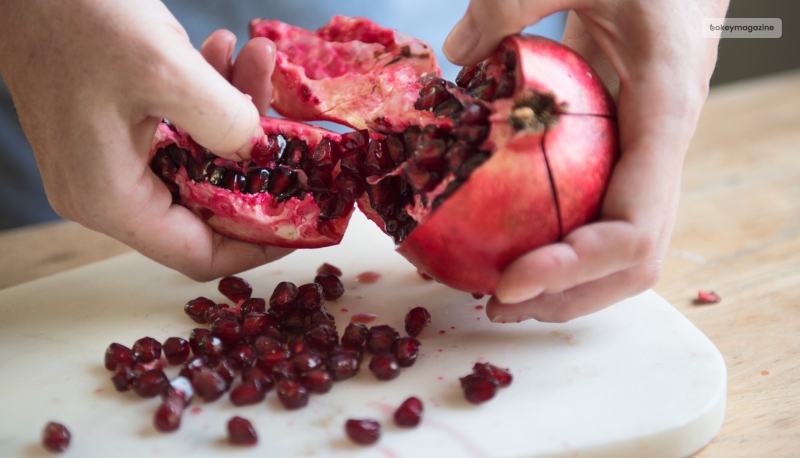
In the US, people usually get pomegranate during the late summer to early winter season. However, some stores import pomegranate from the Southern areas. Thus, people living in the Northern Hemisphere get them throughout the year.
So, there will never be a scarcity of the fruit throughout the year.
Let me give you a small tip before we get to the best way to eat pomegranate seeds. Heating pomegranate seeds is not the best option as it drains out a lot of their flavor. The best way to enjoy pomegranate seeds is by eating them fresh and raw and sometimes as a garnish.
Picking Up The Correct Fruit
Selecting a pomegranate is comparatively easy. In most grocery stores in the US, you will always get the most ripe and fresh lot of pomegranates. You need to check for the weight of the fruit and the firmness of its skin. The heavier the fruit, the more seed quantity will be inside. I mean, you definitely do not want to pay for a fruit that is practically empty from the inside. Once you buy them, make sure you keep them in the freezer. This will ensure that they are in a healthy condition for as long as possible. Also, there is nothing better than ice-cold and juicy pomegranate.
Eating Fresh
It is very important that you always eat the freshest pomegranate. Cut the fruit in half. Then, scoop out those small little seeds into a bowl or a cut. You can either eat them raw or put them in your salads, desserts, oatmeal, yogurt, and more.
Freezing
Do you have way too many of those pomegranates to eat in one go? You can just save the seeds by spreading them on your regular baking sheet and then freezing them for two hours. Then, simply put them in your freezer bags and just keep them in the freezer. This will make sure that they are fresh for the longest time.
Juicing
When you juice a pomegranate, you save yourself from the trouble of buying it in a bottle. Also, that is way more expensive than a regular pomegranate. Also, when you juice it at home, you can be sure it is fresh and contains nothing else. Bottled pomegranate juices contain other ingredients, such as sodium and sugar.
Just simply squeeze the fruit or use a juicer. Separate the fibers with the help of a strainer, and it is all ready to drink.
Pre-Packaged Seeds
You can also buy pomegranate seeds from the market. This way, you would not have to scoop or store the whole fruit in your refrigerator. From there, you can directly use them in multiple ways.
Adding Pomegranate Seeds To Your Diet
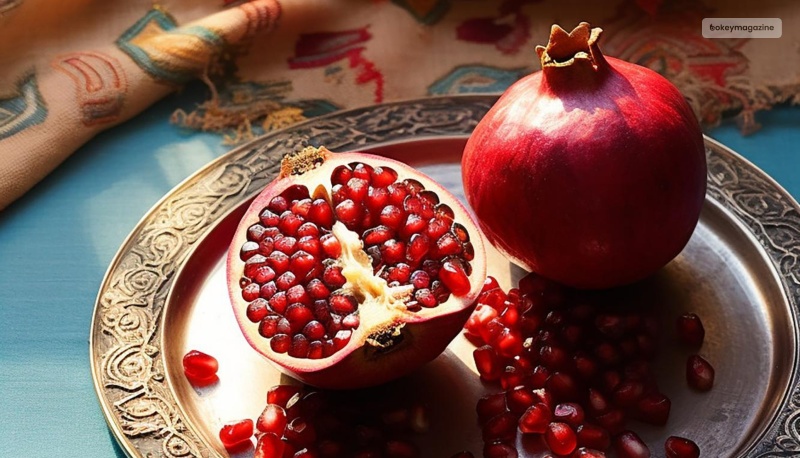
Pomegranate seeds are not like any other fruit you get in the market. Because they are so small in size, you can literally mix them with anything and everything. The fun part is that they can easily fit into a small yogurt cup if you wish to eat it with yogurt.
But, their sweet flavor makes them very welcoming for a number of dishes.
If you are confused as to where you should use pomegranate, here are some options that you might want to explore:
- You can use it as a sprinkler on yogurt, oatmeal, or smoothie bowls.
- Toss the seeds into your savory green bowls or green salads.
- Pomegranate seeds go best with parfaits or fruit salads.
- You can blend them into smoothies. You can also extract its juices to make fresh pomegranate juice.
- Just eat them raw.
- They taste delicious with whipped cream. Makes up for a simple and effortless dessert.
- They look beautiful and give some extra taste to cheesecakes, puddings, and ice creams.
- Mix them with peppers, cilantro, and onions for a simple fruit salsa.
- They go best with margaritas, cocktails, and other drinks.
Simple Ways To Cut Open A Pomegranate
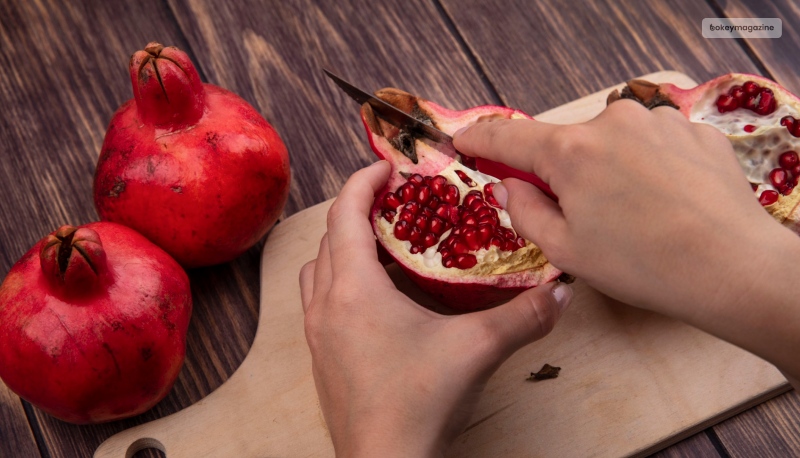
To do all of the mentioned things before, it is important that you know how to smoothly cut open a pomegranate. You need to make sure that you do not waste any of the seeds or the juice that seeps out while you are cutting a pomegranate. It may not be as complicated as cutting an avocado, but cutting a pomegranate needs some amount of patience.
There are mainly two simple and quick ways to cut and remove the seeds from a pomegranate.
With A Spoon
The most popular and simplest way to take the seeds out of a pomegranate is by using a wooden spoon.
You need to make sure to use a well sharp knife and cut the pomegranate around its middle. Then, hold the same on top of a bowl. The seeds should be facing down towards the bowl.
Hit the skin with the back of your wooden spoon. Keep doing it till you have all the seeds fallen down on the bowl. Once you collect them all, rinse them well and strain the seeds. Now, they are all set to enjoy.
Scoring With A Knife
Another popular method to seed a pomegranate is to use a knife to score it.
First, use a pairing knife to remove the tiny stem right at the top of the fruit. You may also know it as the flower. Then, score its sides by cutting down the skin between the ridges right from the top to the bottom. If you cannot feel the ridges, make six even cuts around the pomegranate.
To prevent the juices from seeping, make sure the cuts are not too deep.
Then, grip the fruit and place your thumps right at the top where the flower originally was. Then, gently pull the fruit apart to separate each of the sections.
The best way to do this is by keeping it on top of a bowl. This will make sure that all the loose ends fall in the bowl.
To continue with this, peel the white membrane which surrounds every section of the seeds.
At last, working over a clean surface or a bowl, pull the ends of each of the sections back towards you. This will push the seeds out into the bowl.
Depending on how ripe the fruit is, you can just run some of the seeds to separate them.
Now, they are all set to eat.
Possible Risks Of Eating Pomegranate Seeds
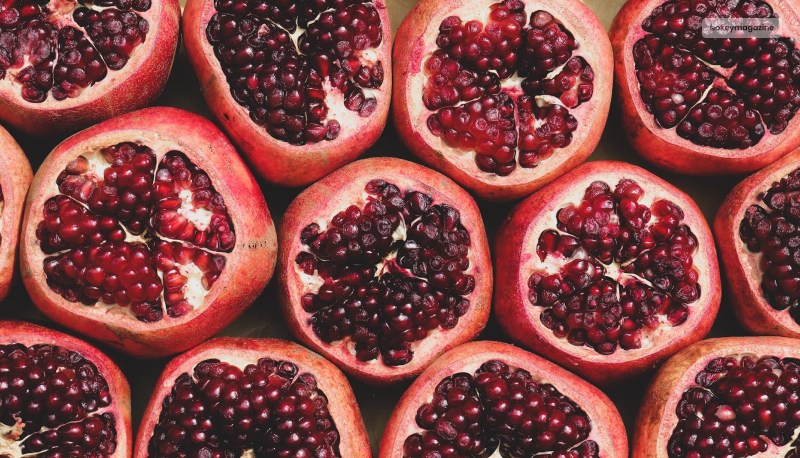
While there are way too many benefits of eating pomegranate seeds, there are a couple of risks that you need to be aware of, too. While they are very rare, you can always be safe than sorry.
Interaction With Blood Thinners
Pomegranate seeds may get in touch with blood thinners because of their high content of vitamin K and possible antiplatelet properties. Vitamin K interferes with how effectively a certain blood thinning medication would work. This may result in blood clotting. In addition to it, pomegranate seeds contain certain compounds that have antiplatelet activity. This may further increase bleeding risks when combined with blood-thinning medications.
Allergic Reactions
While it is a very rare occurrence, some people may be allergic to pomegranate seeds. Allergic reactions to pomegranate seeds may have symptoms like hives, itching, swelling, or breathing difficulties. These reactions usually happen because of the presence of protein in the seeds. This triggers the immune system in some people. If you feel like you are having an allergic reaction to pomegranate seeds, seek medical attention immediately. Also, do not consume pomegranate or any of its products in the future.
The Bottom Line
I am hoping to have cleared all your doubts about “is it ok to eat pomegranate seeds?”
Pomegranate seeds are excellent sources of nutrients and vitamins. They are also very effective in improving hemoglobin count in the blood. There are a number of ways in which you can consume pomegranate seeds – raw, with salads, juice, etc. However, some people may be a bit allergic to it. So, if you see any allergic symptoms coming up, try to avoid pomegranate or any of its products in the near future.
For More Interesting Article Click Below!!



















All Comments
Meghan Perez
28 March, 2024
of course like your website but you have to check the spelling on several of your posts. A number of them are rife with spelling issues and I in finding it very troublesome to inform the reality on the other hand I will certainly come back again.
Reply